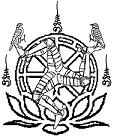Mind precedes all phenomena, created by the mind which rules it.
If the mind is corrupted, and one speaks or acts,
from there stress comes, like a wheel of a cart follows the track of an ox that pulls it.
2.
Mind precedes phenomena, created by the mind which rules it.
If the mind is pure, and one speaks or acts,
from there pleasure comes, like a shadow that does not leave.
3.
“I have been scolded,” “I have been hurt,” and “I have been conquered & enslaved.”
Those who hold these thoughts do not calm hatred.
4.
“I have been scolded,” “I have been hurt,” and “I have been conquered & enslaved.”
Those who do not hold these thoughts, thoroughly calm hatred.
5.
Hate does not cease to exist because of more hate,
Friendliness causes its end, this is an old truth.
6.
There are those who do not know “we to shall die,”
Those who do know this, cease to quarrel.
7.
Living reflecting on beautiful aspect of things, with unrestrained senses,
eating an immoderate amount, lazy, and of low energy.
They are subdued by Māra, like a weak tree is when blown by the wind.
8.
Living reflecting on the non-beautiful aspect of things, with restrained senses,
eating a moderate amount, faithful, and of firm energy.
They are not subdued by Māra, like a rocky mountain is not when blown by the wind.
9.
Whoever puts on the robes of a mendicant, being stained (internally) with defilements;
without self-control or truthfulness, does not deserve the robes.
10.
Any person who leaves behind faults, being restrained with moral principles,
with self-control & truthful, is worthy of the robes of a mandicant.
11.
Those who see unessential wisdom to be essential, and the essential to be unessential,
They do not understand, and partake in dissident intention.
12.
Knowing the essential as essential, and unessential as unessential,
they do understand, and partake in upright intention.
13.
Just as rain would penetrate a poorly-thatched house,
in the same way an undeveloped mind allows attachment to enter.
14.
Just as rain would not penetrate a well-thatched house,
in the same way a developed mind does not allow attachment to enter.
15.
Here they mourn; after departing they mourn; in both places the one who acts in unskilled ways mourns.
They mourn & suffer hardship, having understood the impurity of such actions one does.
16.
Here they are happy; after departing they are happy; in both places the one who acts skilfully is happy.
They are happy & are glad, having understood the purity of such actions one does.
17.
Here they are remorseful; after departing they are remorseful; in both places the one who acts in unskilled ways is remorseful.
Repeatedly they cry “I am remorseful due to the crimes I have done,” when they arrive at a state of misery
18.
Here they delight; after departing they delight; in both places the one who acts in skilled ways delights.
Repeatedly they cry “I delight due to the virtue I have done,” when they arrive at a state of fortune.
19.
Even if many words connected to the truth (and discipline) are spoken, the negligent man does not act in accordance with them.
Like a cowherd who counts the cows of others, they do not have a share in the conformity of the dhamma.
20.
Even if few words connected to the truth (and discipline) are spoken, but they live in-line with the path of truth.
Having abandoned attachment; anger; & delusion, with upright understanding and fully released mind.
Unattached to anything in this world or another, they do have a share in the conformity of the dhamma.


 RSS Feed
RSS Feed
